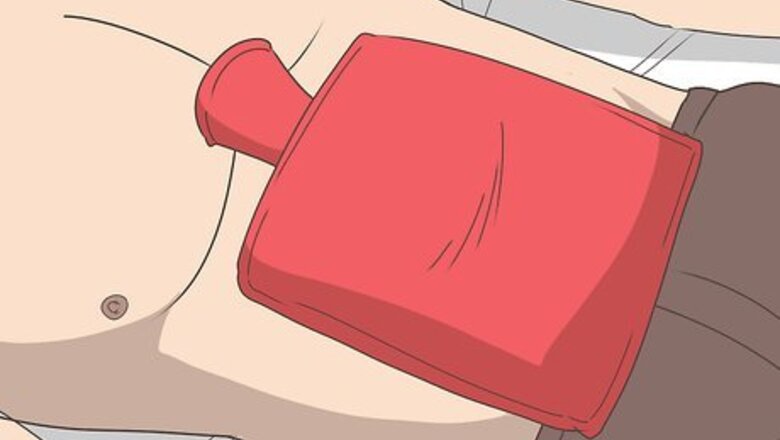
views
Relieve gas pains with a hot pad.
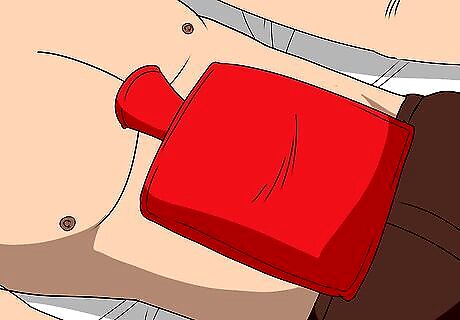
You can also use a hot water bottle. For quick relief of abdominal pain caused by gas and bloating, lie down and lay a hot water bottle or warm compress across your stomach. The heat may help soothe your pain until the bloating subsides. To avoid burns, don’t sleep with a heating pad on your body. Only use the pad for 15-30 minutes per hour, then take a break to let your skin cool. If your heating pad doesn’t have a cloth cover, lightly wrap a towel around it to protect your skin.
Soothe your stomach with mint or chamomile tea.

These herbs may reduce excess gas and bloating. Buy mint or chamomile teabags, or use fresh mint leaves or dried chamomile flowers. Steep the ingredients in hot water for a few minutes and then slowly sip the tea. Other herbs and spices that may help include: Anise Caraway Coriander Turmeric Fennel
Eat slowly and chew your food well.
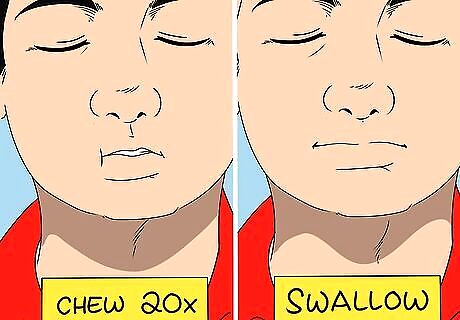
Chewing your food thoroughly makes it easier to digest. That means those gassy bacteria in your gut will have less food to break down. Take small bites, chew them up thoroughly, and avoid gulping down your food and drink. Eating too fast also puts you at risk of swallowing air. To make yourself slow down, put your fork down after every bite.
Avoid chewing gum or sucking hard candies.
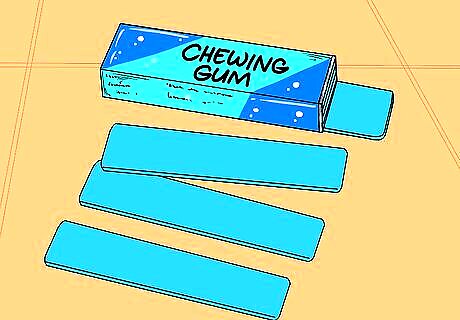
Chewing gum can cause you to swallow excess air. When you gulp air into your stomach, it creates excess gas, leading to belching, bloating, and discomfort. Be careful about sucking on candies or drinking through a straw, as well. Instead of drinking through a straw, sip directly from the cup. Smoking can also make you swallow a lot of air, so consider that another good reason to work on quitting!
Steer clear of common foods that cause gas.
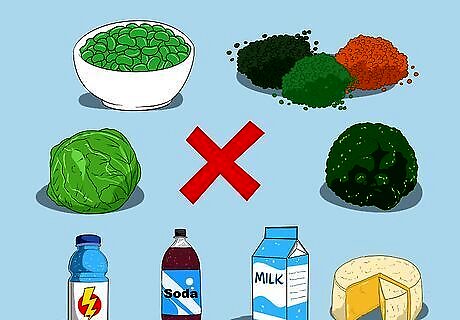
High-fiber vegetables are a major cause of bloating and gas. Gas forms when bacteria break down undigested food in your colon. This is totally normal, but you might find that some foods give you a lot more gas than others. For example, you might want to cut back on: Certain vegetables and fruits, such as beans, peas, and other legumes, broccoli and cauliflower, cabbage, brussels sprouts, apples, peaches, prunes, and whole wheat. Artificial sweeteners like sorbitol and mannitol. Soda and other carbonated drinks, which can cause air bubbles to get trapped in your stomach. Fried, greasy, or fatty foods, which can slow down digestion and trap gas in your intestines longer. Foods like garlic, eggs, and fish won’t necessarily cause more gas, but they can make your gas smell a lot worse.
Go dairy-free if you have lactose intolerance.
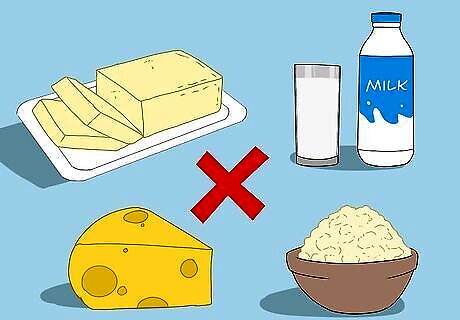
Dairy can cause painful gas and bloating in some people. Cow milk contains lactose, which disagrees with many people's digestion. If dairy triggers your symptoms, avoid milk, cheese, ice cream, and other dairy products made with lactose milk. If you’re not ready to cut out dairy completely, try drinking only small amounts of milk or sticking to yogurt or hard cheeses, which many people find easier to digest. You can find a variety of dairy alternatives in most grocery stores. Popular options include soy, almond, rice, and oat milk. You can also reduce your symptoms by taking lactase supplements before you eat or drink dairy. Talk to your doctor before trying lactase supplements, especially if you’re pregnant, breastfeeding, or taking other medications or supplements.
Limit simple carbohydrates and sugars.
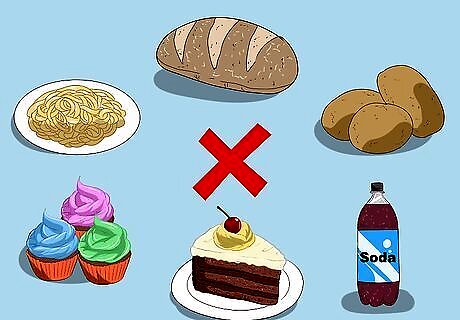
Carb intolerance can cause bloating, cramps, and heartburn. If you always feel icky after eating bread, baked goods, or candy, you might have a problem digesting simple carbs. Cut back on sweets and products made with refined flour, like white bread or pasta. You may notice a big difference in how you feel! Carbs are still an important part of your diet, so don’t cut them out completely. Stick to foods that are rich in healthy, complex carbs, such as starchy vegetables, whole grains, and fruit. Don't replace sugars with artificial sweeteners, as they can also cause bloating.
Avoid gluten if you have an allergy or intolerance.
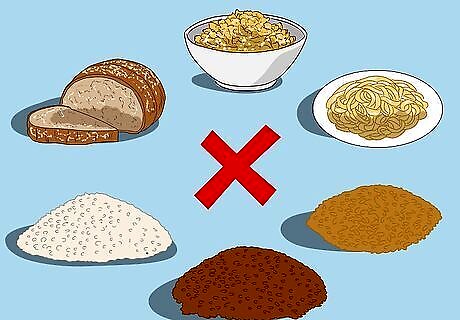
Gluten is a protein found in certain grain products. If you're sensitive to gluten, you may experience bloating and gas after eating it. The best way to avoid bloating and gas is to cut out products that contain gluten. Gluten is typically found in bread, baked goods, pasta, seasonings, and similar items. Read labels to look for products that are labeled as "gluten-free." Your doctor or a dietitian can help you determine if you have gluten sensitivity or intolerance.
Ask your doctor about activated charcoal supplements.
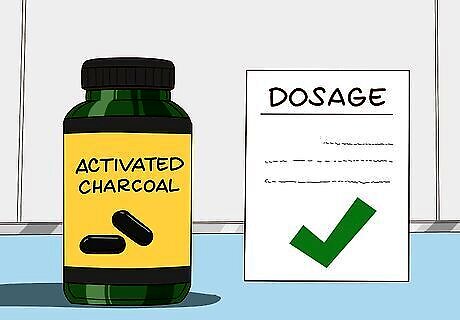
Activated charcoal may absorb excess gas. Some studies show that it’s especially effective when you combine it with gas-relief medications like simethicone (Gas-X). Check the instructions on the package to figure out how much to take and whether to use it before or after a meal. Ask your doctor before taking any supplements, especially if you're already taking other medications. Activated charcoal may prevent your body from absorbing some medications properly. Possible side effects of activated charcoal include staining of the tongue, black stools, and constipation.
Take over-the-counter gas relief medicines before you eat.
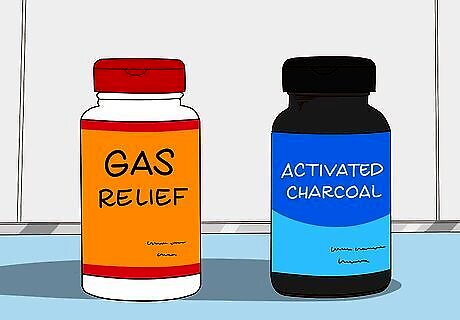
Most OTC gas medicines work by preventing gas. Before your next meal, try a digestive enzyme supplement such as Beano or BeanAssist. These medicines break down the hard-to-digest carbohydrates that tend to cause bloating and gas. Simethicone-based medications, such as Gas-X or Mylanta Gas Minis, are intended to break down gas bubbles that have already formed in your gut. However, it’s not clear how effective these medicines really are. Always read the directions on the package before using an over-the-counter medication to treat or prevent gas. Talk to your doctor or pharmacist first if you have a medical condition or are taking other medicines or supplements.
Let out gas instead of trying to hold it.
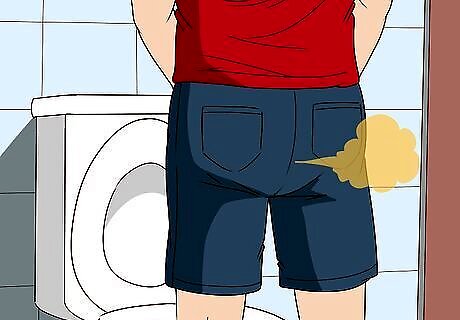
You’ll feel a lot better once you relieve the pressure. When you’re gassy, it can feel embarrassing to just let it rip. But remember, passing gas is a necessary and normal part of the digestion process. Holding it in will just make you feel more bloated and uncomfortable. Instead of holding it, find a comfortable place to release your gas. If you are in public when a bout of gas or bloating strikes, find a bathroom where you can stay until the pain has subsided. Moving around can help, too. Take a brisk walk around the block or walk up and down a set of stairs to help the gas make its way out.
See your doctor for frequent or severe symptoms.
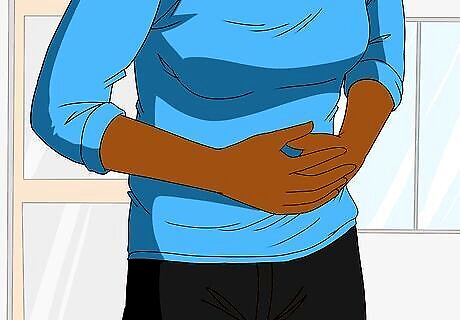
A little gas is normal, but too much can signal a problem. If you have painful bloating or excess flatulence daily, the issue may extend beyond what you can fix by changing your diet. See your doctor if you have frequent gas pains that interfere with your daily life, or if you have severe symptoms such as bloody stools, diarrhea or constipation, weight loss you can’t explain, or frequent nausea or vomiting. You may have a condition such as: Irritable bowel syndrome (IBS). IBS affects your colon and causes cramping and diarrhea when you consume certain foods. Celiac disease. This is a digestive disorder triggered by eating gluten, a protein found in bread and other food products containing wheat, barley, or rye. Crohn's disease, a gastrointestinal disorder that can become severe if not treated effectively.




















Comments
0 comment